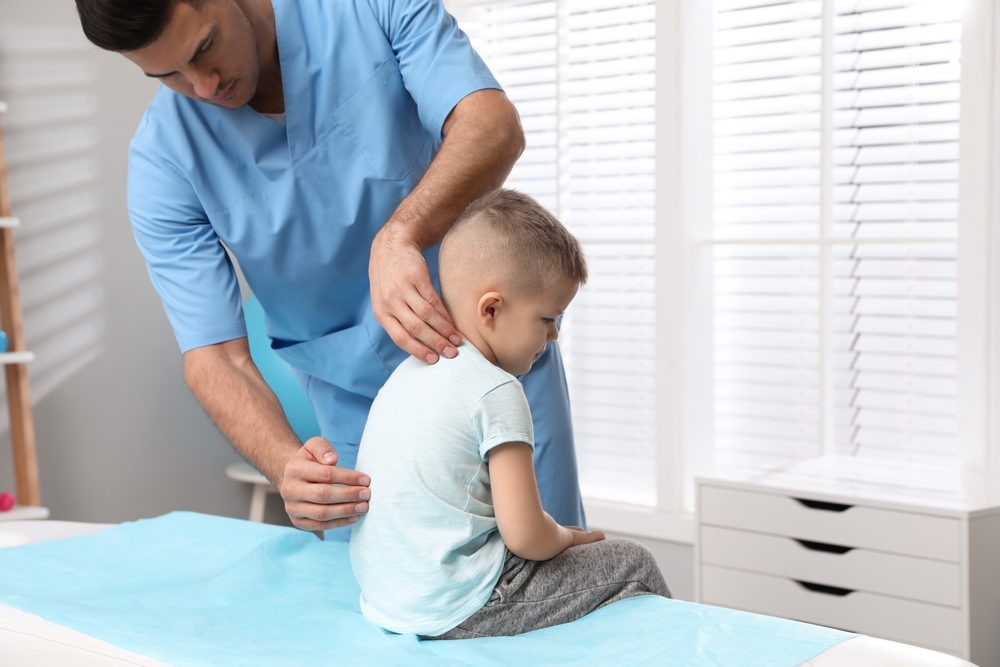 For those with school-aged children, you might come across a permission slip allowing your child to have a scoliosis screening at some point. While this back condition may not be a top concern for parents, there’s good reason why many primary care doctors and schools keep a close eye on spine development. Here are a few things parents should be aware of concerning their child’s growing back and this particular spinal condition.
For those with school-aged children, you might come across a permission slip allowing your child to have a scoliosis screening at some point. While this back condition may not be a top concern for parents, there’s good reason why many primary care doctors and schools keep a close eye on spine development. Here are a few things parents should be aware of concerning their child’s growing back and this particular spinal condition.
It’s not entirely uncommon.
Simply put, scoliosis is an abnormal curve of the spine that may cause pain or cosmetic concerns, if severe enough. Most of the time, scoliosis is idiopathic, meaning there’s no straightforward cause for the condition. According to the American Association of Neurological Surgeons, scoliosis affects between 6 and 9 million people in the United States alone.
“Idiopathic scoliosis happens to normal, healthy people,” says Kevin Neal, MD, board-certified pediatric orthopedic surgeon with Nemours Children’s Health, Jacksonville, and chief of pediatric orthopedic surgery at Wolfson Children’s Hospital. “It’s likely genetic and can run in families, but it can happen out of the blue. It typically occurs while children are growing.”
Other types of scoliosis include congenital (when the spine forms incorrectly in the womb) and neuromuscular (caused by a separate underlying condition, such as muscular dystrophy or cerebral palsy).
You can monitor your child at home.
Although pediatricians and schools often examine children for scoliosis, parents and caregivers can still watch out for early signs and symptoms, including:
- Asymmetry in the trunk of the body or the back
- Asymmetry in the waist (For example, if you place your child in front of a window in the daytime, there will be more daylight on one side than the other, suggests Dr. Neal.)
- Shoulder blades or ribs protruding on one side
- Hips or shoulder blades not being level
According to Dr. Neal, scoliosis is three-dimensional. In other words, this means that the spine can curve in any direction, leading to body parts that look off-balance or asymmetrical. Especially take note of preteens or young teenagers, as they are part of the age group that is most commonly diagnosed.
“It’s not specifically related to age, but more related to growth spurts, and all children go through a major one in their early teen years,” Dr. Neal says. “It happens around age 12 for girls and 14 for boys. It can happen to both, but scoliosis is seven to eight times more common in girls.”
If you’re worried, your child’s doctor can help.
If you have any concerns at all surrounding your kid’s spinal development, Dr. Neal recommends scheduling an appointment with your pediatrician. Your doctor can conduct a scoliosis screening, decide if X-rays are necessary, and refer you to a specialist who can suggest treatment options.
The need for surgery is pretty rare.
The good news? (Yes, there is some!) In most scoliosis cases, the spinal curves are so minor or small that they can simply be monitored by a specialist until your child grows out of them.
“Many smaller curves will not progress and don’t require other specific treatment. Braces can help with larger curves while patients are still growing. Surgery is only necessary when bracing doesn’t work or the curves are too severe,” says Dr. Neal.
Whether a little one needs monitoring or must have surgery, rest assured that he or she will likely come out of scoliosis treatment with a very positive result and ready to take on the world.
“The outlook is great. They should be the same as everybody else without significant limitations,” Dr. Neal says. “Idiopathic scoliosis doesn’t cause medical problems, limit function, or affect the internal organs. Even after brace treatment or surgery, patients recover and have normal activity levels.”
If your child is diagnosed with scoliosis and needs expert care for their growing back, Wolfson Children’s Hospital, in collaboration with Nemours Children’s Health, Jacksonville, offers world-class orthopedic care. Call 904.697.3600 to schedule an appointment.
















